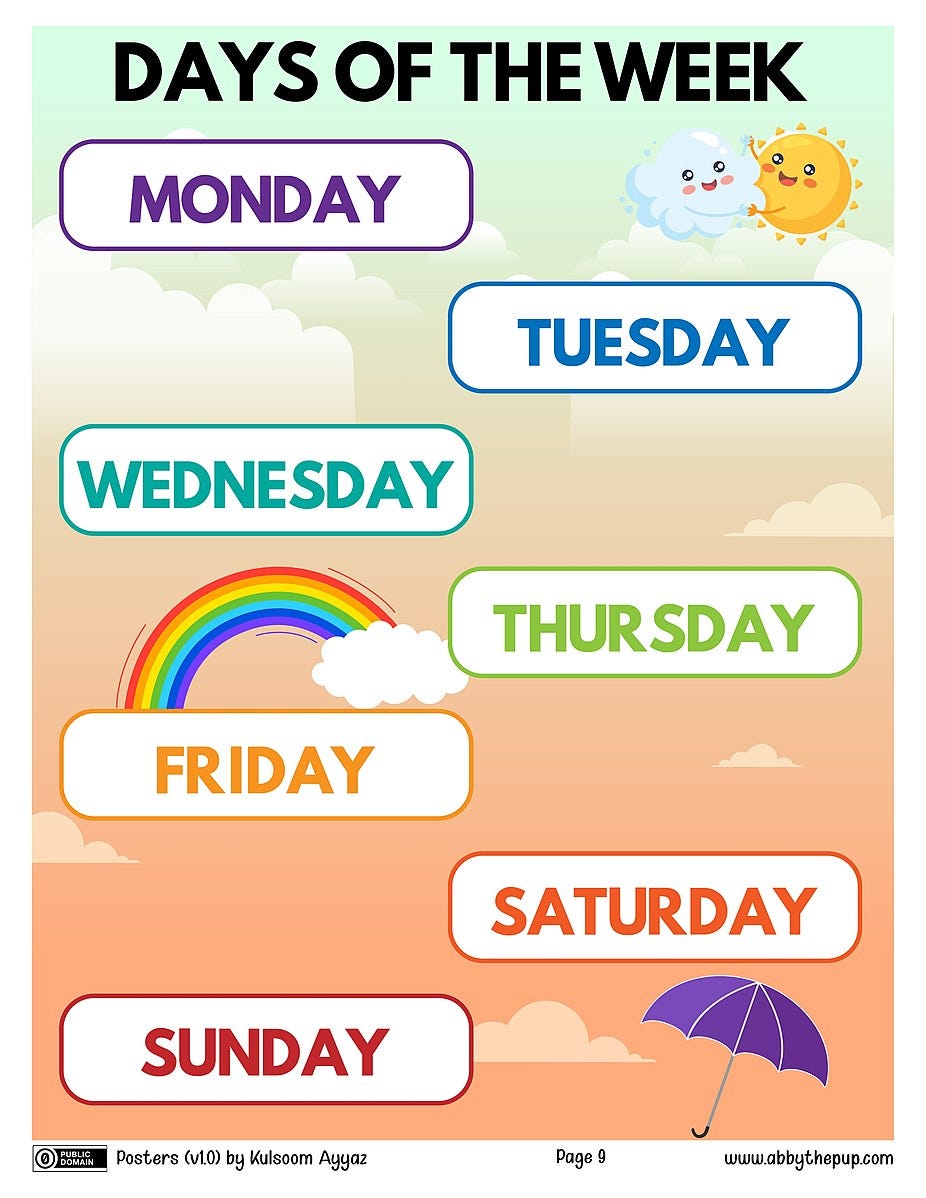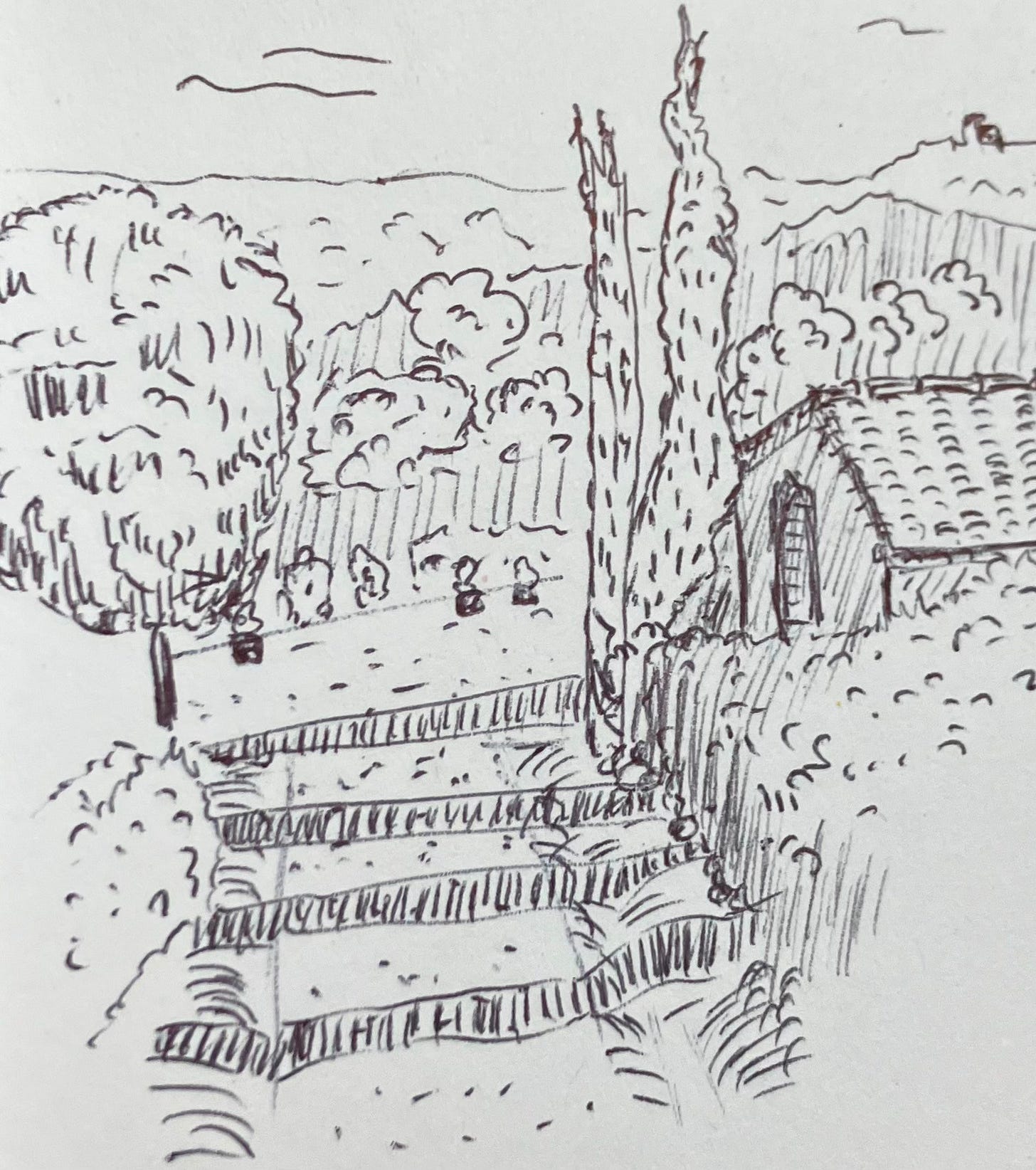Has the "Hum" bothered you ?
Also in this post... the origin of the names we give to the days of the week; James Lee Burke on the importance of friends for writers; park esthetics, and more
Do you hear a persistent low-frequency sound at night?
I do. For the last few years I’ve been baffled by a kind of quiet rumble, which I hear in Vancouver and also in Elora, Ontario, when I’m there.
The sound is a constant humming, like a repetitive drone. It can be heard most clearly in the middle of the night, usually from midnight to dawn. To my ear it sounds like some sort of machine or a truck engine idling somewhere in the distance. It sometimes throbs.
I’ve asked family members about it, but no one else seems to notice it. However, I know I am not alone. In many countries around the world people have complained about this type of sound for decades, so much so that it has acquired a name: the “Worldwide Hum.”
Omagh, North Ireland, is one of the latest hotspots for this phenomenon. About a dozen residents complained in late 2023 to authorities about a constant hum keeping them up at night. The local council investigated for some months and in June, 2024, said it had narrowed the focus to a number of industrial enterprises as the probable causes of the sound. Other possible sources were power lines, farm equipment, streetlights or the wind. However, since no formal legal proceedings had been launched, no further action was taken and no definitive answer was provided, leaving some residents frustrated.
Some studies have suggested that the sounds may be a hearing disorder, a form of tinnitus that afflicts a small percentage of the population.
The persistent hum has been heard in North America, Australia and Europe. Some locations have generated their own nicknames, such as the Taos Hum, the Auckland Hum and the Windsor Hum. Glen MacPherson, a researcher in British Columbia, started a World Hum Map and Database Project in 2012 to try to understand the phenomenon. He, too, was puzzled by the sound, and wrote about his eerie experiences and research here.
My theory for the low-frequency noise is that it is caused by a variety of location-dependent sources. I suppose it’s possible that my ears are generating the hum on their own, but I am not convinced of that. I think my hum comes from motors in buildings running HVAC (heating, ventilation and air conditioning) systems. During the day other noises mask these low-pitched sounds and they become noticeable only in the relative quiet of the night. Occasional bouts of insomnia make it easier to hear it.
What about you? Do you hear a hum? What are your thoughts on this?
Other info :
Popular Mechanics article, The Mystery Sound is Invading Towns - What Is It?
Omagh Hum Source Traced But Not Made Public
The Hum on Wikipedia
How our days were named

A number of different cultures seem to share the same origins for the names of the days. How did this come to be?
The story begins with the Sumerians and the Greeks.
From the earliest days of antiquity the names of the week were inspired by the evening sky, specifically by the designation of the planets. Those original planetary names were names of gods, a practice ascribed to the Sumerians, the earliest known literate civilization in history (roughly 5,500 BC to 1,800 BC). The Sumerians lived in Ancient Mesopotamia, the region of the Middle East that is today Iraq.
The Greeks later carried on this tradition of naming the planets, but instead used terms identifying gods from their own pantheon.
After the Greeks, the Romans (you can see where this is going) adopted Latin names for most of those gods and planets. They did the same for the days of the week: the word for Sunday, therefore, is derived from Sōl or Helios (the Sun); Monday is Moon-day (luna in Latin); Tuesday is named after the god of war, Mars (Martīs); Wednesday derives its name from Mercury, the god of commerce, communication and travel; Thursday from Jove or Jupiter, the god of thunder; Friday from Venus, the goddess of love; and Saturday is named for the planet Saturn, also a Roman god, responsible for time, abundance and wealth.
As the English language was formed, the Anglo-Saxons living in the British Isles mixed in Norse and Germanic references with some of these Latin names, so that the Old English language developed parallel names; some were the same as the Greco-Roman ones, some different, but all familiar. Historian Robert Lacey succinctly explained them:
“Sun-day and Moon-day were followed by Tiw’s-day, Woden’s-day, Thor’s-day and Freya’s-day, named after the Germanic gods of war, wisdom, thunder and love respectively.” Saturn’s-day remained faithful to its Greco-Roman roots, just like Sun-day and Moon-day. 1
To see the overlap, here’s a comparative chart of a few languages.
In the frenzy of our weekly activity we tend to take our days for granted; rarely do we consider how they came to be named. Personally, I like the Norse-inspired “Thor’s-day” better than “Jove-day.” However, between “Freya’s-day” and “Venus-day” I can’t say which I like better. “Woden’s-day” feels ponderous, a good name for the middle of the week, what many workers cheerfully also call “hump day” as the weekend starts to come into view.
~~~
James Lee Burke on the role of friends in the lives of writers

In the acknowledgments page of James Lee Burke’s latest novel, Clete, the writer eloquently expresses a sentiment that resonates with many artists:
I have been fortunate in the kind of people who have helped me during my career. A career is easy to lose. Without dramatics, you can quietly put away your pen and typewriter or keyboard and listen to the naysayers and watch your talent float out the window like a balloon. But I’ve always been around good people, the kind of protagonists I think you’ll find in my books. Every character is a mix of someone I’ve known, for good or bad, but mostly for good. To be an artist is the greatest gift in the world; but the friends of an artist are also a great gift, and I have had hundreds and hundreds of friends whose names should also be on my books. That of course will not happen, but at least I can say to the living and passed-on, thank you, thank you, thank you.
James Lee Burke is a New York Times bestselling and award-winning mystery writer. Clete is published by Atlantic Monthly Press.
~~~
Park esthetics
Walking in Trafalgar Park in Vancouver, which also hosts a practice field for a youth baseball team, I noticed this metal storage container, used for securely locking sports equipment.
I’d like to salute the park board for planting these trees around it. It may seem a little odd from the angle above, but I’m sure the residents across the street are happy that from their vantage point they mainly see the green shrubs and not the metal container.


I find details like these in urban planning and management to be wonderful touches that make a big difference. Congratulations to the local municipality for thinking of this.
~~~
Sketch
My sketch this week is from a trip to Tuscany with friends a few years ago. Shadows from the afternoon sun, two laneways and a farm house, a few kilometres from San Gimignano.
Thanks for reading Zanepost.
Until next time,
-Renato
From Lacey, Robert. Great Tales from English History (Back Bay Books: Little, Brown and Company, 2007), p. 26.










It seems like just yesterday we were in Tuscany. Great memories.
I only know about tinnitus, Renato, but I haven't suffered from it so far.
I didn't know about the "Hum". Interesting and disturbing, I guess!